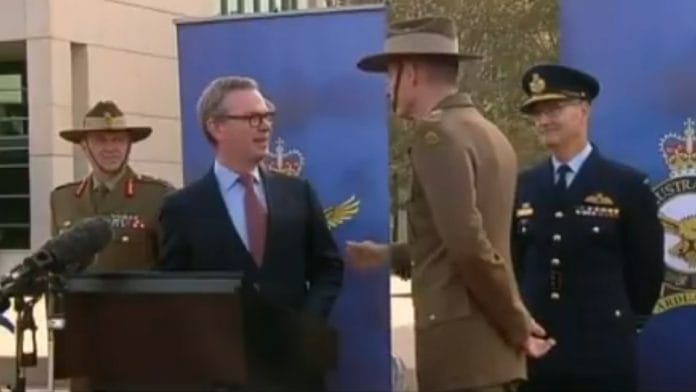New Delhi: In a global lesson for projection of civil-military relationship in the public sphere, the Australian defence chief pulled the country’s top-ranking armed forces officials away from a press conference Thursday as the country’s defence minister took on political questions.
During a morning event held to announce the name of the new Air Force chief, defence chief Angus Campbell walked up to Australian defence minister Christopher Pyne and requested that the country’s military officials step aside as he answers political questions.
At the press meet, Australia’s defence force’s second-in-command, Vice Admiral David Johnston, the next chief of joint operations, Major General Greg Bilton, and the newly announced Air Force chief, Air Marshal Mel Hupfeld, were standing directly behind Pyne.
Campbell said it would not be appropriate if the military chiefs were seen in the same frame while Pyne makes political statements.
So the defence chief tapped on Pyne’s shoulder and whispered, “My apologies… I might just ask that the military officers step aside while you’re answering these kind of questions.”
Pyne was answering a question pertaining his stand on his party’s “preference deals with One Nation”.
Military retreat! Watch as @CDF_Aust asks Minister @cpyne if military top brass can step away from the press conference as questions turn political pic.twitter.com/TFvUQuyooF
— Andrew Greene (@AndrewBGreene) March 28, 2019
One Nation is an Australian political party, which has been accused of soliciting millions of dollars from American gun lobby NRA.
Also read: Thank god, India’s leaders didn’t fight over nuclear weapons like they are over A-SAT
Civil-military relations
Campbell’s strict adherence to the democratic norms of maintaining an apolitical image of the military is in stark contrast with some of the recent incidents across the world.
In the past couple of years, US President Donald Trump has been accused of politicising the military. Trump’s extremely partisan speech at an event for Boy Scouts came under severe criticism in 2017.
Even in India, current Army chief Bipin Rawat has been criticised on multiple occasions for making politicised statements.
The little deft intervention made by Campbell is a lesson for countries across the world.
Campbell and Pyne
Campbell has previously served as the Commander Joint Task Force 633 — responsible for all the Australian forces deployed in the Middle East and Afghanistan. Later on, as the Lieutenant General, he oversaw the controversial Operation Sovereign Borders.
The defence chief’s intervention becomes all more significant when one considers the political profile of the politician in question, Pyne.
Since 2013, Pyne has witnessed a somewhat meteoric rise in Australian politics. For years together, Pyne was just another elected leader. But in 2013, he was named the Leader of the House (responsible for government’s parliamentary affairs) and the education minister.
In 2015, he continued as the Leader of the House and was appointed minister of industry, innovation, and science. A year later, he was appointed minister for defence industry. And finally in 2018, he became the minister of defence.
Along with being one of the country’s most significant cabinet ministers, Pyne is also considered to be the government’s chief tactician.
Through public intervention, Campbell not only asked the country’s defence minister to get in line, but also sent a signal to the entire political establishment.
Coincidentally, a recent Australian TV show, Secret City, gained a lot of popularity as one of its dominant themes was based on a deeply politicised military.
Also read: Trump is not behind New Zealand racist outrage, Australia is







Its nice to see this moral uprightness, though Australia is an Island nation with no shared borders, and their nearest neighbouring country is possibly a few thousand KMs away. I don’t know if they have any enemy nations.
In contrast we are in a low grade war with Pakistan for decades, and China, Burma, Bangladesh keeping pecking at our borders.
And our politicians and our bureaucracy are not exactly honest to the cause of the soldiers. Defence procurements are mired in controversies, and critical offensive and defensive military equipments are in short supply or not available.
The military leadership has no choice but to find creative means to get at least some of their needs addressed, including working on the politicians and bureaucrats.
In these circumstances, it is indeed commendable that they have maintained a very high level of separation from politics, barring a few exceptions. In fact everytime they’re called upon to serve during natural calamities or man made accidents, they deliver in a secular and non partisan manner to the highest standards.
Context makes all the difference – Australia enjoys a unique level of insularity from other nations, India is surrounded and at war continuously. We should judge the behaviours according to the context.